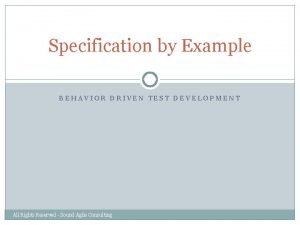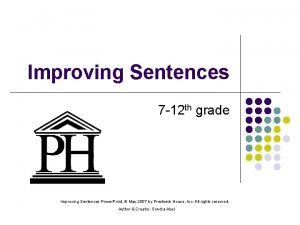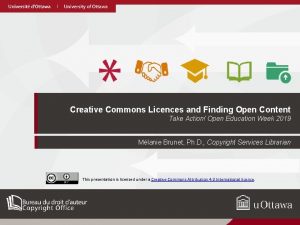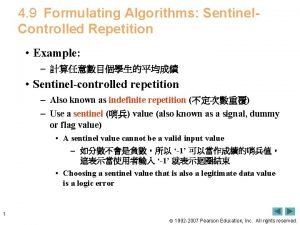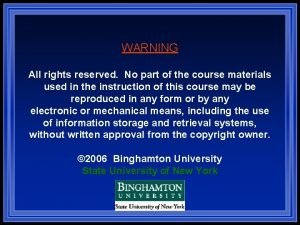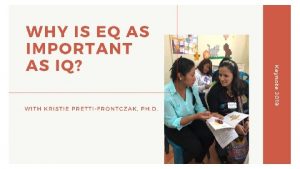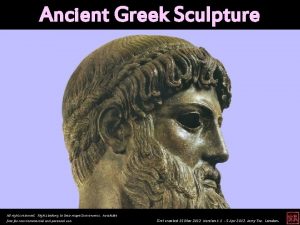Power Point Slides 9780195988376 All rights reserved No
























- Slides: 24

Power. Point Slides 9780195988376 All rights reserved. No part of this publication may be reproduced, stored in a retrieval system, or transmitted, in any form or by any means, without the prior permission in writing of Oxford University Press Southern Africa (Pty) Ltd, or as expressly permitted by law, or under terms agreed with the appropriate designated reprographics rights organisation. Enquiries concerning reproduction outside the scope of the above should be sent to the Rights Department, Oxford University Press Southern Africa (Pty) Ltd, at the address below. Published by Oxford University Press Southern Africa P O Box 12119, N 1 City, 7463, Cape Town, South Africa

Chapter 1 THEORETICAL PERSPECTIVES IN PSYCHOLOGY

Learning outcomes to keep in mind whilst studying this chapter What are perspectives in general and what is work behaviour and why are they important? • Describe the subject matter and the methods of the eight different schools of thought in psychology • Explain the main focus of each school of thought • Describe the method/s of each school of thought (where applicable) • Describe the essence of meta-psychology • Discuss the main themes of post-modern approaches.

What are schools of thought? • Intellectual movements whose followers share more or less the same ideology • Influenced by emerging and active views in science and culture • Incorporate theoretical propositions on − What subject the matter of psychology should be − What methods should be used • Different theoretical and methodological propositions for studying human beings • Basis frameworks for construction of contemporary psychology.

What do you see? What sensations are elicited when you are presented with a stimulus? According to Structuralism, it is not whether you know or do not know the correct name of the stimulus that is of importance, but rather the sensations which the stimulus concerned elicits from each person.

Structuralism (Wundt, Titchener) The subject matter • Analyse Consciousness into basic elements Basic premise • The whole is equal to sum of its parts ─ breaks the mind down into its most basic elements Main objective • Sought to identify the components of the mind Method • Introspection ─ self-observation of one’s immediate experience of a stimulus Identifying statement • Human beings function similarly to machines • Structuralism cannot be used on children • Therapist trained in introspection must be mature in order to manage biases.

Functionalism: A Conscious reaction to structuralism (James; Darwin) The subject matter • The functions of the consciousness/the mind Basic premise • How does the mind affect what people do? Main objective • The individual’s adaptation to the environment • The role emotions play in social adaptation • Evolution theory and individual differences Method • Observation tests, animal research and experiments with identical twins Individual differences • Studied through heredity and mental abilities Identifying statement • Attributes which influence adaptation are common for human beings and certain animals.

Behaviourism: Nurture, not nature • Behaviourist school of thought emphasises the environment (nurture), rather than innate biological predispositions (nature). “Give me a dozen healthy infants, well-formed, and my own special world to bring them up in and I’ll guarantee to take any one at random and train him to become any type of specialist I might select – doctor, lawyer, artist, merchant-chief, and yes, even beggar-man and thief…” A quote by John B. Watson who is considered to be an important contributor to classical behaviourism, who paved the way for B. F. Skinner's radical or operant behaviourism.

Behaviourism: First force in psychology (Watson; Pavlov) The subject matter • Observable behaviour Basic premise • Stimuli/events association basis of mental processes • Behaviour can be predetermined by the control of environmental factors – Tabula rasa Main objective • Focus on Stimulus–response (S–R) approach • Stimulus–organism–response (S–O–R) approach Method • Cognitive processes and social learning • Observation/experiments Identifying statement • Environmental factors determine behaviour.

What do you see? Do the individual parts of this whole make sense? Gestalt Psychology argues that the elements of a system should work together for the survival/benefit of the whole.

What do you see? By merely re-arranging the elements of the system such that they are in viewed as a unit (happy or sad) the system (the faces) take form. Can you now find sense in the meaning of the main assumption of the Gestalt? The whole is MORE than the sum of its parts?

Gestalt psychology: Developed as a reaction to structuralism (Wertheimer) The subject matter • Wholeness of experience – e. g. perception. The whole is greater than sum of its parts Basic premise • All aspects of human beings’ experiential field are interrelated and perceived as a balanced, simplified and organised whole Main objective • Perception and problem-solving Method • Phi-phenomenon Example of a workplace gestalt application • Organisational culture as it is shaped by the perceptions that the members of an organisation have on its meaning.

What do you see? Is there really any movement? This perception of movement in a stationary object, called the Phi phenomenon.

The Psychoanalytic school: Second force in psychology (Freud) The subject matter • Role of the unconscious processes in mental functions/disorders Basic premise • Making sense of what seems not to make sense – i. e. there are no coincidences in life Main objective • Conflicts between structures and processes • Behavioural dynamics and unconscious processes lead to deeper understanding of issues Method • Clinical observation – free association Example of a workplace psychoanalysis application • The study of behavioural dynamics and unconscious processes lead to a deeper understanding of organisational issues.

Humanist or phenomenology: Third force in psychology Reaction against behaviourism and psychoanalysis The subject matter • Focus on positive aspects of conscious mental activity Basic premise • Human beings strive for psychological growth, self-actualisation, autonomy and selffulfilment Main objective • Focused on the person as a whole Method • Eidetic reduction • Systematically reducing visual images which occur when recalling an event in one’s mind to draw out the absolutely necessary and invariable components that make the mental object what it is Example of workplace psychoanalysis application • Hawthorne’s experiments – influence of working conditions in on morale.

Cognitive psychology The word “cognitive” is the Latin word meaning “to know”. The subject matter • Understanding information organisation in the mind Basic premise • Mind is seen as being similar to a computer • Humans are regarded as problem-solvers Main objective • Perception is a process of knowing more than seeing • Consciousness studied as a coherent structure Method • Analysis of information processing General Systems Theory.

Metapsychology: Psychological perspectives Metatheories are integrative approaches that overcome the limitations of adhering to one particular theoretical point of view.

Metapsychology: Deconstructionism • Coined by French philosopher Jacques Derrida • Reading of texts and finding new meaning in them • Texts are unlimited networks of unlimited meanings • Difference: What the text says and what it means • Play of activities in which meanings of opposites can be overturned • A construction process through reinterpretation of language theory.

Metapsychology: Constructivism • George Kelly • Finding meaning through understanding how people construct their personal beliefs • Developed through the individual’s interpretation of external social and cultural factors • Understanding of an individual’s constructs through dialogue and shared meaning • Constructs can change through meaning-making • Dialogue is thus reciprocally influential.

Metapsychology: Social constructionism • Kenneth Gergen • Emphasises social interaction in gaining knowledge and new meanings • People do construct themselves and their knowledge can be reconstructed by deconstruction.

Positive psychology The subject matter • Optimum experience Basic premise • Positive subjective experiences facilitated by development of human strengths and virtues Main objective • Priority given to having capacity for goodness, morality, virtuous character Method • Analysis of information processing General Systems Theory • A meta approach because it links aspects of different perspectives • In South Africa positive psychology is alternatively called the “Science of Strengths” • By developing strengths in workplace employees and managers can develop excellence in their distinctive talents.

Positive psychology: Strengths that are related to various virtues

In summary: The main focus of each school of thought Structuralism Focuses on sensations and perceptual experiences Functionalism Investigates functions of mental processes in adapting to the environment Behaviorism Concentrates on observable, measurable behaviours and not mental processes Gestalt psychology Emphasises perception: the whole is more than the sum of the parts Psycho-analysis Emphasises the unconscious mind Humanistic psychology/ phenomenology Emphasises inner-self and importance of subjective feelings Cognitive psychology Focuses on cognitive functions and reasoning Metapsychology Combination of concepts and methods from different schools – uses concepts in varied applications Postmodernism Broad cultural movement indicating the relativity in social meaning – things can always change Deconstructionism Reading texts, etc and finding new meaning in them Constructivism How people construct their own beliefs Social Constructionism Interaction in gaining knowledge and new meanings Positive Psychology Priority given to having capacity for goodness, morality, virtuous character

Thank you.
 All rights reserved example
All rights reserved example Copyright 2015 all rights reserved
Copyright 2015 all rights reserved All rights reserved sentence
All rights reserved sentence Creative commons vs all rights reserved
Creative commons vs all rights reserved Confidential all rights reserved
Confidential all rights reserved Sentinel value
Sentinel value Copyright 2015 all rights reserved
Copyright 2015 all rights reserved 2012 pearson education inc
2012 pearson education inc Microsoft corporation. all rights reserved.
Microsoft corporation. all rights reserved. Microsoft corporation. all rights reserved.
Microsoft corporation. all rights reserved. Microsoft corporation. all rights reserved
Microsoft corporation. all rights reserved Pearson education inc. all rights reserved
Pearson education inc. all rights reserved Dell all rights reserved copyright 2009
Dell all rights reserved copyright 2009 Warning all rights reserved
Warning all rights reserved All rights reserved c
All rights reserved c Quadratic equation cengage
Quadratic equation cengage Warning all rights reserved
Warning all rights reserved Confidential all rights reserved
Confidential all rights reserved Microsoft corporation. all rights reserved
Microsoft corporation. all rights reserved 2010 pearson education inc
2010 pearson education inc Copyright © 2018 all rights reserved
Copyright © 2018 all rights reserved Gssllc
Gssllc Copyright 2010 pearson education inc
Copyright 2010 pearson education inc Pearson education inc. all rights reserved
Pearson education inc. all rights reserved Confidential all rights reserved
Confidential all rights reserved
